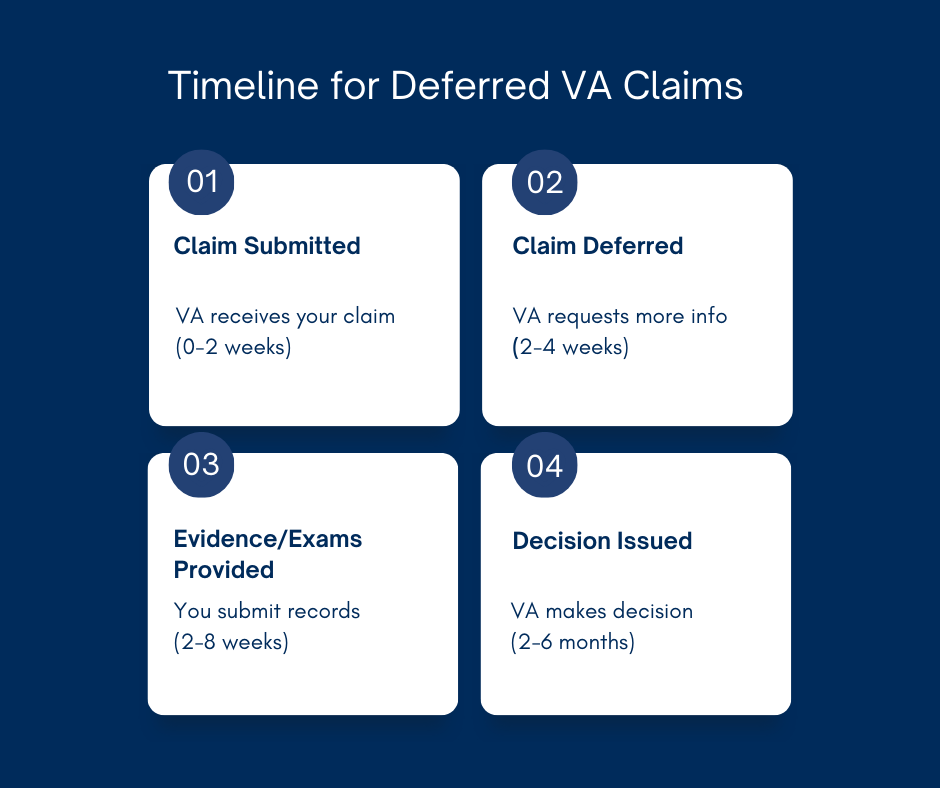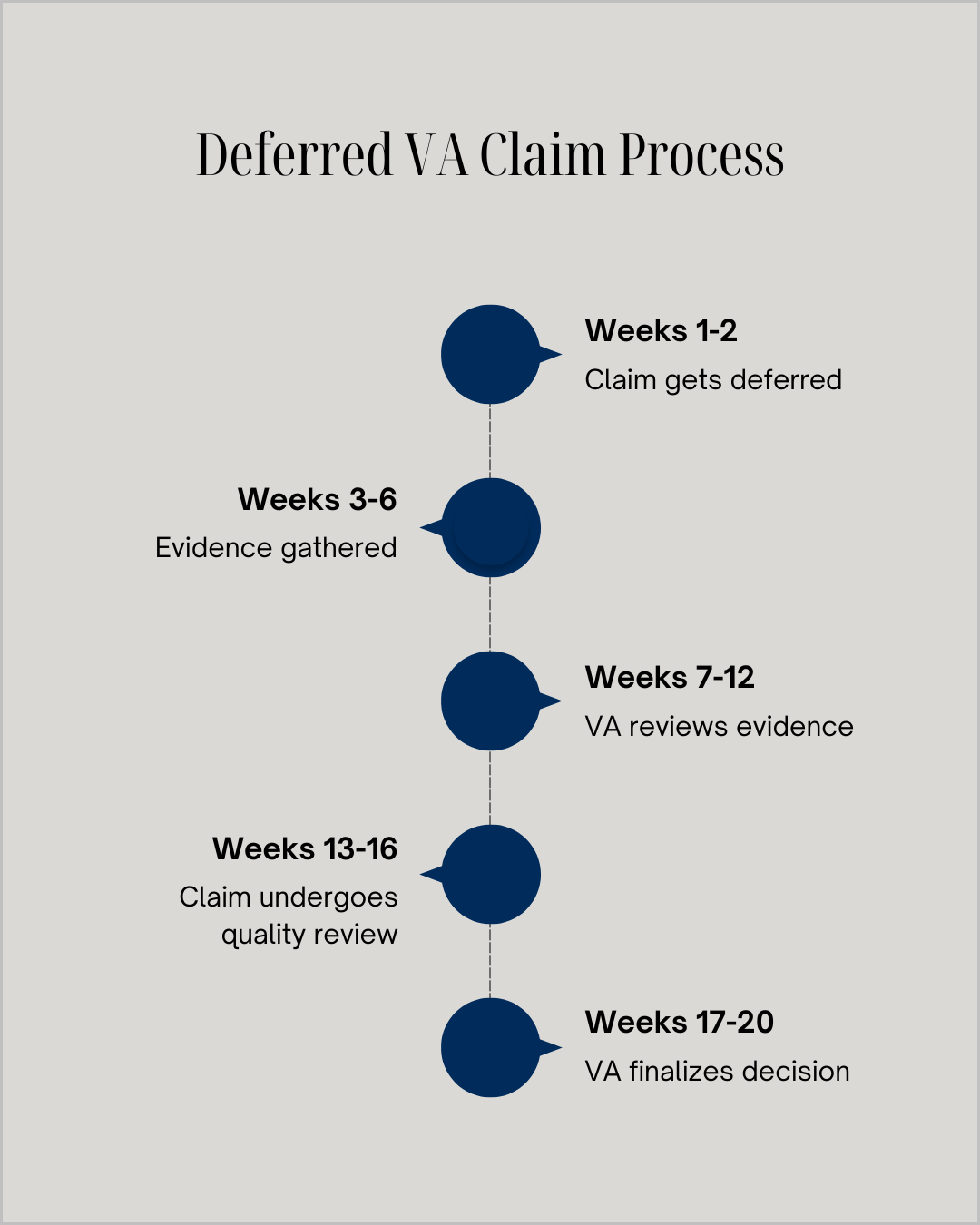How Long Does a Deferred VA Claim Take?
If you’ve ever filed a VA disability claim, seeing the words “Deferred” can be confusing and stressful. Many veterans worry it means their claim is being denied, but that’s not the case.
A deferral simply means the VA needs more information—like medical records, exams, or clarification—before making a decision.
A deferred VA claim usually takes 30–90 days for simple cases, but more complex claims with multiple conditions or extra paperwork can take 3–6 months or longer.
How long it takes depends on the type of deferral, the complexity of your claim, and how quickly the VA can get the records or schedule exams.
If that seems like a lot, don’t worry—we’ll break it all down step by step. You’ll learn why claims get deferred, what happens next, and what you can do to keep your claim moving.
What Does a Deferred VA Claim Mean?
A deferred VA claim means the VA cannot make a final decision yet because they need more information.
This could be extra medical records, service documents, or a scheduled exam. It’s normal to feel frustrated or anxious when your claim is deferred—many veterans experience the same uncertainty.
Being deferred does not mean your claim is denied or approved. Sometimes, only parts of your claim are deferred, while other parts keep moving forward.
This is normal and doesn’t reflect poorly on your case. Think of a deferred claim as a temporary pause to make sure all the details are correct.
You’re still on the path to a decision, and taking the right steps can help your claim move more smoothly.
Why is a VA Claim Deferred?
There isn’t just one reason a VA claim gets deferred. It can happen for a variety of reasons, and it often depends on the details of each individual case.
For some veterans, the delay might be about medical evidence, while for others it could be paperwork or administrative issues.
Medical Reasons:
C&P exam needed – Sometimes the VA wants a Compensation & Pension (C&P) exam to get a clearer picture of your condition and how it connects to your service. If this exam hasn’t happened yet, they can’t move forward.
Nexus opinion required – A “nexus” is just the medical link between your current condition and your time in service. If the VA doesn’t have a strong opinion from a doctor making that connection, they’ll defer until they get one.
Conflicting or unclear medical evidence – If the records show different things, or if the evidence isn’t clear enough, the VA might hold off until they can sort it out.
Administrative Reasons:
Missing documents – This could be service treatment records (STRs), private medical records, or anything else needed to build a full picture of your case. If something important is missing, the VA has to wait.
Errors or incomplete forms – If a Disability Benefits Questionnaire (DBQ) or other paperwork has mistakes or isn’t filled out completely, the VA may need corrections before making a decision.
What to Do After Your VA Claim is Deferred
The process for moving your claim forward is actually pretty straightforward as long as you stay patient and organized.
Here are a few clear steps you can take to move your claim moving forward without added stress.
Read the notification carefully – Make sure you understand why your claim was deferred and what documents or information the VA needs.
Gather requested evidence – Collect any service treatment records, private medical records, or other documents the VA asked for. The more complete your submission, the faster your claim can progress.
Schedule and attend exams – If the VA requests a follow-up Compensation & Pension (C&P) exam, make it a priority to attend. These exams are often crucial for service connection decisions.
Submit additional paperwork promptly – Don’t wait until the last minute. Sending everything in as soon as possible shows the VA you’re proactive and helps avoid further delays.
Keep detailed records – Track all correspondence, appointments, and documents you submit. Having a clear record makes follow-ups easier if anything gets lost.
Follow up regularly – Check the VA portal or call your regional office to see if they received your documents and if anything else is needed. Staying engaged helps keep your claim from stalling.
Remember, a deferred claim isn’t a denial — it’s a temporary pause so the VA can make an accurate decision.
Staying organized, proactive, and patient is the best way to move your claim forward.
Deferred VA Claim Timeline
Here is what a typical timeline looks like for deferred claims:
Week 1–2
Your claim gets flagged as deferred. The VA requests additional evidence or schedules Compensation & Pension (C&P) exams.
Week 3–6
Records and medical evidence are gathered. You may attend C&P exams, and the VA begins adding new documentation to your file.
Week 7–12
The VA reviews the updated file, including medical opinions and supporting evidence, to determine if the requirements for your claim are met.
Week 13–16
Your claim enters quality review. Another team checks the file for accuracy and ensures no errors were made.
Week 17–20
The VA finalizes your decision. A notification letter is mailed, and if approved, payments are scheduled.
This timeline isn’t exact for everyone, but it gives you a realistic picture of how long a deferred claim might take once the VA has to gather more evidence.
Factors that Affect the Deferral Timeline
Not every deferral moves at the same speed. The length of time depends on the details of your case, how complex it is, and how quickly resources are available. Here are some common examples:
Simplicity of Deferral
Simple deferrals are usually resolved more quickly, especially when only minor documents or routine exams are involved.
Single missing form: (such as a recent audiogram), typically resolved in 30–45 days.
Routine C&P exam rescheduled: often adds 45–60 days.
Minor records delay: (like waiting on private cardiology notes), usually about 90 days.
These cases often move faster because fewer parties and less documentation are involved.
Complexity of Case
More complex claims take longer because multiple conditions or rare medical issues require careful review.
Multiple conditions: requiring different specialists may take 5–6 months.
Rare conditions: needing expert review (for example, Lyme disease) can stretch to 8–12 months.
These cases require more coordination and expert input, which naturally extends the timeline.
Availability of Resources
Finally, external factors like exam backlogs or hard-to-access records can delay even simple claims.
Rural backlog: delaying C&P exams often adds 3–4 months.
Military records archived off-site: can take 6–9 months.
How quickly these resources become available can significantly affect when your claim is completed.
Can You Speed Up a Deferred VA Claim
While you can’t control the VA’s schedule entirely, there are ways to help your claim move faster. Responding promptly to VA requests keeps your file from getting delayed unnecessarily.
If you have urgent medical needs, the VA can sometimes prioritize your claim. Letting them know about pressing health concerns may help speed things up.
Submitting a complete initial claim is another key step. Providing all forms, records, and documentation up front reduces the chance of a deferral, saving you months of waiting.
Ultimately, some delays—like backlogs or unavailable records—are out of your hands. Staying organized and responsive gives your claim the best chance of moving efficiently.
Tips for Interacting with the VA
Many veterans don’t realize how much staying organized and keeping in touch with the VA can help speed up a deferred claim.
While you can’t control everything, being proactive makes a difference. Here are the five most important things to do:
Answer VA requests quickly: Respond as soon as the VA asks for more information to avoid delays.
Check on pending items and your VA.gov account: Make sure the VA has received your papers and nothing is missing.
Keep a record of all communication: Save emails, letters, and notes from phone calls so nothing gets lost.
Work with a VSO or accredited helper: They can guide you, help collect records, and speak for you if needed.
Send in extra evidence fast: If the VA asks for more documents, get them together and submit them quickly to help move things along.
Doing these things gives your claim the best chance to move smoothly. Many veterans underestimate how much keeping organized and staying in touch can help, but it really makes a difference.
The likelihood of a deferred VA claim being approved varies based on the type of deferral and the quality of the additional evidence provided.
While specific approval rates for deferred claims are not publicly available, understanding the general approval rates for different types of claims can offer some insight:
Higher-Level Reviews (HLRs): These reviews involve re-evaluating the existing evidence without new submissions. The success rate for HLRs is estimated to be around 50%.
Supplemental Claims: These claims allow veterans to submit new and relevant evidence that was not previously considered. The success rate for Supplemental Claims is also estimated to be around 50%.
Board of Veterans' Appeals (BVA) Appeals: These appeals are reviewed by a Veterans Law Judge and offer three choices—direct review, evidence submission, or a formal hearing. The approval rates range from 34-41%
It's important to note that these rates are general estimates and can vary based on individual circumstances.
Providing thorough and well-supported evidence can significantly improve the chances of a favorable outcome.
Deferred VA Claim and Back Pay / Benefits
A deferred VA claim is not as bad as it might sound. One big reason is back pay, which is the money you are owed from your original claim effective date, basically the day you first filed your claim.
Even if the VA takes a while to make a decision, you will still get the money you are owed once your claim is approved.
The timing of your benefits can be a bit unpredictable. A deferral might mean you have to wait longer to actually see the payments.
The good news is your original claim date is preserved, which makes the wait a little less stressful.
Sometimes the VA will give partial ratings, which is when part of your claim is approved while the rest is still being reviewed. That means you can start getting partial back pay for what is already approved even if the rest of your claim is still in progress.
Overall, waiting on a deferred claim can be frustrating, but you do not lose out on what you have earned.
How to Avoid Deferred VA Claims
One of the best things you can do for deferred claims is avoid them to begin with. Here are a few things you can do to get your claim through the first time:
Submit complete documentation from the start.
Double-check DBQs and medical opinions for clarity.
Work with a VA-accredited representative or VSO.
Keep copies of everything and track your submissions.
Following these steps can save time and prevent unnecessary delays. Being careful and organized makes the whole process smoother.
Final Thoughts
While the timeline for deferred VA claims can vary, most are ultimately resolved within a few months, though more complex cases may take longer.
During this waiting period, it’s important to stay proactive by checking your claim status and submitting any requested evidence promptly.
Delays can be frustrating, but deferrals are a normal part of the process, and most claims are eventually approved once the VA has all the necessary information.
FAQ
-
Most deferred VA claims are eventually approved, though the timeline can vary widely depending on the complexity of the case and the evidence required.
-
When the VA defers a claim, it means they need more information before making a decision, so the claim is temporarily put on hold
-
The hardest VA claims to get are typically those involving conditions that are difficult to medically verify or link directly to service, such as certain mental health issues or rare diseases







